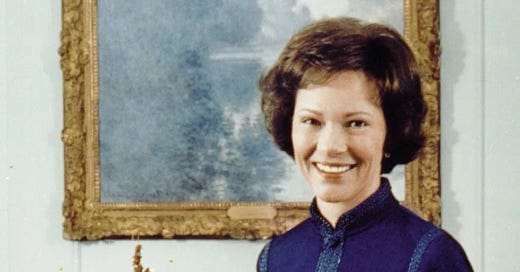What They Will Remember -- Rosalynn Carter
This question may be something that you have asked yourself before; I know I have. What will people be saying about me the day after I die? Rosalynn Carter died yesterday at age 96. Most remember Jimmy and Rosalynn Carter as having occupied the White House for one term in 1977 to 1980. But today the news articles are only briefly mentioning that fact because the overall theme in remembering Rosalynn Carter is the fact that she was one of the first to highlight the mischaracterization of mental health issues in our society.
Misconception of Those Suffering with Mental Health
This misconception of mental health and those who suffered from it has caused them to live in darkness because seeking medical help only caused further scrutinizing and condemnation. She was described in one news article as being “a trailblazing mental health advocate”. Whether she held a position in the political world or in her philanthropic work, she always had one overreaching focus — mental health.
When her husband, Jimmy Carter, was running for Governor of Georgia, Rosalynn had the opportunity to meet a lady who stopping by the campaign event after her night shift at a local cotton mill. She casually congratulated the woman on getting some rest when she arrived home and the dear lady replied, “No, I will be caring for my daughter who suffers from mental illness. Rosalyn told the story many times and purposed to bring light the those suffering with mental illness as well as their caregivers.
Rosalyn Carter’s Passion for Mental Health Issues
Before ever entering the White House, Rosalynn served the sitting Georgia governor as a member of his Commission to improve Servies for the Mentally and Emotionally Handicapped. She was instrumental in the passage of several state laws which improved mental health services in Georgia.
She served as her husband’s personal representative by standing as an Honorary Chairperson of the President’s Commission on Mental Health. For the first time in White House history, Rosalyn Carter, a first lady, attended most cabinet meetings as well setting up an office in the West Wing. No first lady had done either of these two things.
Growing the Moment in the White House
At a Presidential campaign event, Rosalyn pressed into the line to shake hands with attendees alongside her husband. When Jimmy Carter asked her what she was doing, she replied, “I want to know what you are going to do about mental health issues.” He then joined her in a crusade to fight the health system that kept mental health issues under cover and unattended to.
Rosalynn served as the chair of President Carter’s Commission on Mental Health. She was active in that position to coordinate with Columbia University’s Mental Health Program on promoting mental health education to laypeople and to the medical profession.
President Carter lost his bid to the White House for a second term but that made no difference in the continuing pursuit Rosalynn Carter had committed her life to. It was in the Post-White House years that both Jimmy and Rosalyn founded The Carter Center. Rosalynn integrated into the Carter Center her focus on mental health. During these years this woman with a mission chaired the Carter Center’s Mental Health Task Force to then go on and establish the Rosalynn Carter Fellowships for Mental Health Journalism.
We are also remembering her for the words she wrote in “Everything to Gain”. She says, “If we have not achieved our early dreams, we must either find new ones or see what we can salvage from the old. If we have accomplished what we set out to do in our youth, then we need not weep like Alexander the Great that we have no more worlds to conquer.”
This lady is remembered today as a conqueror with what she accomplished to erase the stigma that mental health issues had stained our culture with. She is remembered for the four children she bore and raised. She and her husband are also remembered for the courage in rising up out of their crushing reelection defeat to create an outstanding post-White House legacy which always included service to others.



